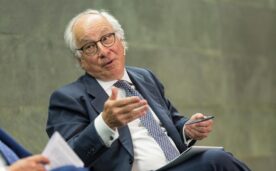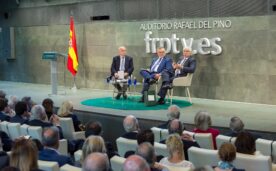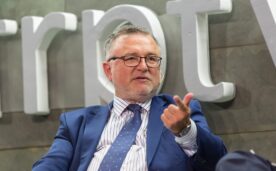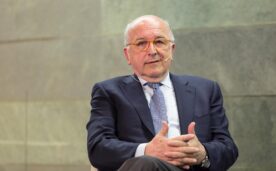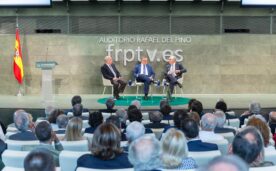On 19 April 2017, the Rafael del Pino Foundation organised the dialogue "Reforms for a rational growth of the Spanish economy" on the occasion of Juan María Nin's latest book "Por un crecimiento Racional" published by Deusto. Joaquín Almunia and John Müller took part in the event together with the author.
Juan María Nin GenoaSenior advisor in international strategy and finance. A graduate in law and economics from the University of Deusto and Master in Laws and Political Sciences from the London School of Economics, he has first-hand knowledge of the world of business management, finance, energy and international economic policy. Since he was part of the team of the Minister for Relations with the European Communities (1978-1980), he has been a staunch supporter of the European project. He is also one of the main advocates of the opportunities of the free trade agreement between the US and the EU (the TTIP) and, as former president of the Spain-US Council Foundation, an expert on bilateral relations between the two countries. The focus of his professional career has been the banking sector. He was one of the architects of one of the most important bank mergers in the country. During the restructuring of the Spanish financial system, he led multiple operations of purchase and merger of institutions as well as the complex transformation of a savings bank into one of the leading financial institutions in the banking sector.an analyst of the complexity of international relations, economics and politics, he is also a recognised expert in banking, business transformation processes and European politics. Between 2007 and 2014 he was at the helm of La Caixa as Vice-President and CEO and was also CEO of Banco Sabadell. He has also been a member of institutions such as the IMF, Milken Institute and Bildeberg. He is currently Chairman of the Spain-USA Council Foundation and is a member of the governing councils of the University of Deusto, Deusto Business School, ESADE and the Association for Management Progress. In 2013 he received the Grand Cross of the Order of Civil Merit.
Joaquín Almunia is one of the Spanish politicians with the most international experience, particularly in the field of the European Union. He was Vice-President and European Commissioner for Competition between 2010 and 2014, having previously been European Commissioner for Economic and Monetary Affairs between 2004 and 2010. A graduate in Law and Economics from the Universidad Comercial de Deusto, he completed his postgraduate studies at l'École Pratique des Hautes Études in Paris. His professional career began as an economist at the Office of the High Council of the Spanish Chambers of Commerce in Brussels (1972 - 1975), working on issues of the then European Community. He was then in charge of the Economic Cabinet of the UGT trade union from 1976 to 1979 before moving into politics within the Spanish Socialist Workers' Party (PSOE). From March 1979 to April 2004 he was a member of Congress for the Socialist Group. After the victory of the PSOE in October 1982, he served as Minister of Labour and Social Affairs (1982-1986) and Minister of Public Administration (1986-1991) in successive governments of Felipe González. After leaving the executive, he participated in the Senior Managers in Government programme at the Kennedy School of Government at Harvard University. He was also Associate Professor of Labour Law at the University of Alcalá de Henares. In 1997 he became the Secretary General of the Party and ran for President of the Spanish Government in the 2000 General Elections, but after failing to win he resigned from the post. In his last legislature as a Member of Parliament (2000-2004) he was Chairman of the Budget Committee. In April 2004, he was appointed member of the European Commission. In 2010, European Commission President José Manuel Durão Barroso entrusted him with a Vice-Presidency and the reins of the Competition portfolio, from where he has maintained his institutional commitment to Europe. He is currently engaged in research and reflection in different think tanks and other platforms, as well as lectures, books and articles for different media. He is, among others, Visiting Professor at the European Institute of the London School of Economic and Political Science and the Paris School of International Affairs of Sciences Po.
John Müller took his first steps in the world of journalism in the Chilean weekly "Hoy" after graduating from the Pontificia Universidad Católica de Chile. His subsequent studies at the University of Navarra and the IESE Business School definitively linked him to Spain. After his stay in Pamplona, John Müller joined Diario 16 as a correspondent in Chile, where he combined this activity with his work as editor of Hoy, one of the loudspeakers of the democratic movement during the decisive year 1988, when the plebiscite that put an end to the military dictatorship took place. Afterwards, John Müller moved to Spain where he participated in the founding of the newspapers La Gaceta de los Negocios and El Mundo. He remained at this newspaper as deputy editor until he returned to America to run the daily El Universal de Caracas, which won the National Journalism Prize in Venezuela. After his return to the daily El Mundo, he recently decided to resign as Deputy Director of the same newspaper, and after a short period of time he joined a new journalistic project, the daily El Español, also as Deputy Director.
